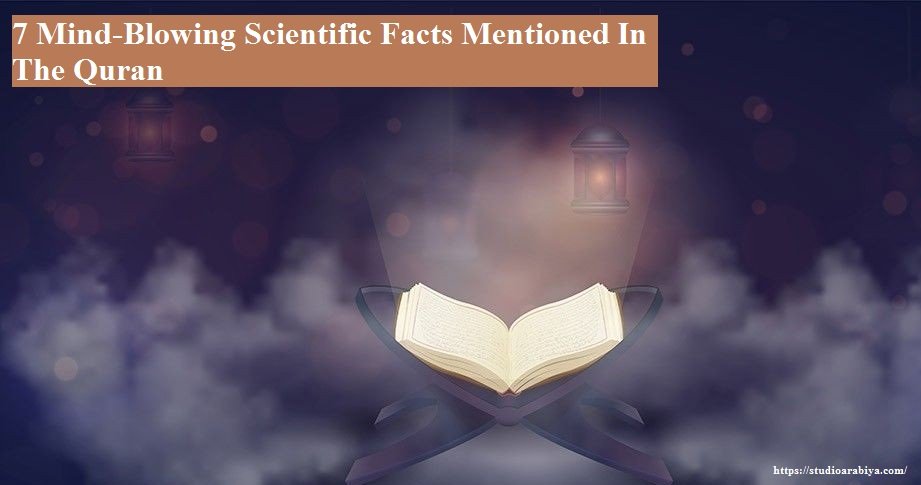7 Mind-Blowing Scientific Facts In The Quran
Introduction
Explore this fascinating list of scientific facts in the Quran, revealing remarkable insights from this ancient text that resonate with modern scientific knowledge. The Quran, the holy book of Islam, is not only a source of spiritual guidance but has also been a subject of fascination for scientists and scholars around the world. For centuries, many have been intrigued by the presence of scientific knowledge and insights in the Quran that were revealed over 1400 years ago. These insights provide a remarkable intersection of science and religion.
According to Islamic tradition, the Quran was first revealed to Prophet Muhammad ﷺ in 609 CE. Over the next two decades, new surahs were dictated to the Prophet ﷺ by the angel Gabriel, who was delivering the exact words of God himself. The Prophet’s final meeting with Gabriel came in 632 CE. He died in June of that year.
1. The Origins of the Universe

The Quran addresses the origins of the universe in a way that has left scientists astonished. It describes the universe’s creation in a single, concise verse:
Do those who disbelieve not perceive that the heavens and the earth were once fused together, and We unfurled them apart?(Quran, 21:30)
This verse hints at the Big Bang theory, which is now widely accepted in cosmology, where the universe is thought to have originated from a singular point of immense density and then expanded.
2. Prenatal Development
The Quran offers insights into human embryonic development that have only been confirmed by modern science in recent decades. For instance, it describes the stages of prenatal development with remarkable accuracy:
“We created man from an extract of clay. Subsequently, we established him as a stable and firmly anchored drop.Then We made the drop into an alaqah (leech-like structure), and then We changed the alaqah into a mudghah (chewed-like substance), then We made out of that mudghah bones, then We clothed the bones with flesh…” (Quran, 23:12-14)
These stages align closely with our current understanding of embryology, providing a unique example of scientific facts in the Quran.
3. Brain Anatomy
The Quran also mentions the concept of “sulb,” which has been interpreted as the backbone or the vertebral column. Modern science has shown that the vertebral column plays a critical role in protecting the spinal cord, aligning with the Quranic description.
4. Oceanic Divisions
The Quran contains references to the separation between different bodies of water without mixing. This concept is in line with modern scientific understanding, as different oceanic currents and water masses do indeed have varying properties that prevent them from easily mixing, much like the Quran’s depiction.
5. Ocean Depths and Internal Waves
In Surah Rahman, the Quran alludes to the presence of barriers between the saltwater and freshwater in oceans:
He has allowed the convergence of two seas.There is a barrier between them. They do not transgress.” (Quran, 55:19-20)
Modern oceanography has discovered the presence of underwater barriers, such as thermoclines, which separate different layers of seawater. These barriers help prevent the mixing of saltwater and freshwater, supporting the Quran’s depiction.
6. The Formation of Clouds
The Quran provides insights into the water cycle and the formation of clouds:
Have you not observed how Allah propels the clouds, then He gathers them, forming them into a cohesive mass, from which rain emerges?
(Quran, 24:43)
This aligns with our modern understanding of cloud formation and the role of condensation in creating rain.
7. The Shape of Mountains
The Quran also contains references to mountains, describing them as pegs:
He has established sturdy mountains in the Earth to ensure its stability…” (Quran, 16:15)
Modern science confirms that mountains indeed have deep roots that stabilize the Earth’s crust and prevent it from shaking.
Conclusion
The Quran is a source of profound wisdom and knowledge, including scientific insights that have only recently been confirmed by modern science. These seven scientific facts mentioned in the Quran are just a glimpse of the treasure trove of knowledge contained in this ancient scripture. The convergence of scientific facts in the Quran with modern understanding continues to spark curiosity and dialogue, emphasizing the harmony between faith and reason.
Other articles and publications:
- +1 (855) 226-2848
- P. O. Box 3125, Conroe, TX 77304
- studioarabiya.com




